IN THIS ISSUE
- Letter from our Executive Director
- Issue Brief: Narrowing Women and Girls’ Health Equity Gap
- Organization Profile: Providence Global Programs
- Goalmaker: Behind the Numbers: Rachel Ndirangu’s Personal Journey to Close the Gender Health Gap
- Member Blogs
- Welcome New Members
- GlobalWA Member Events
- Career Center
Letter from our Executive Director
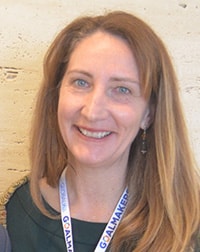
Springtime brings a season of change at Global Washington. May 31 will be my last day at GlobalWA after a 10-year tenure as I announced back in March. The Global Washington Board of Directors along with GoodCitizen activated a search process for the new Executive Director in February and they will be making a decision within the next few weeks. In the meantime, long-time Global Washington board member Jane Meseck will be stepping in as part-time Interim Executive Director and has already started working with me and other staff to ensure the continuity of the organization.
I’m also thrilled to announce Megan Chao as our new part-time Operations and Membership Coordinator. Megan has over 15 years of experience in global development and certificates in Non-profit Management and Bookkeeping. She is passionate about equity, equipping local leadership, and non-profit collaboration to solve systemic issues. We are excited to have her join our team!
I am so proud of the past accomplishments of Global Washington and I can’t wait to see the future innovations under new leadership. The organization will be in good hands and continue to be the trusted, thriving network for global development in the Pacific Northwest. Feel free to reach out to me via LinkedIn and I wish you all well.

Kristen Dailey
Executive Director
Issue Brief
Narrowing Women and Girls’ Health Equity Gap
By Cady Susswein
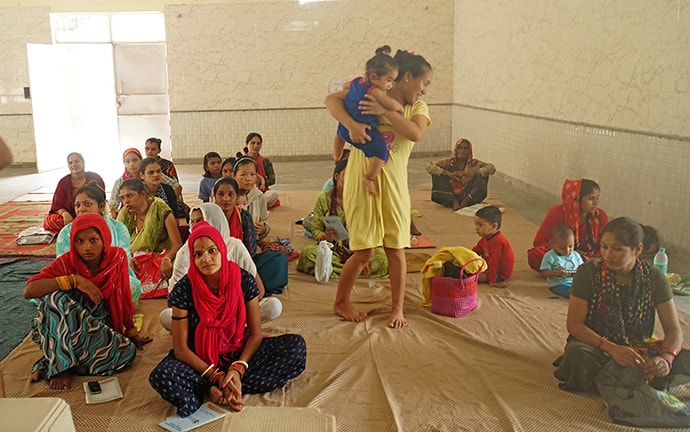
Women waiting for pre- and post-natal care at a Sukarya health clinic, Haryana, India. Photo: Joel Meyers
When we think about global health, we might not specifically think about women’s health, but women spend 25% more time with significant health issues than men. This time adds up to approximately nine years over a lifetime – nine years! The term Disability Adjusted Life Years, or DALYs, represents the loss of one year of full health. This means collectively women have lost 75 million DALYs, or years of full health. That’s astounding. Why is this?
A major part of it comes from a lack of effective health interventions designed specifically for women. For instance, only 4% of pharmaceutical R&D spending goes to female-specific conditions versus approximately 75% of National Institutes of Health funding that goes to a disease affecting one gender goes to male diseases. To add to the issue, 75% of clinical trial participants are men.
Economically, the benefits of closing this health gap are immense. For every dollar spent, there’s a potential $3+ return in economic growth, which would boost the global economy by more than $1 trillion a year by 2040. GlobalWA partners are doing incredible work to close this gap as part of a growing commitment to change the status quo.
Innovation and Healthcare Systems
To start, in the last several years the Bill & Melinda Gates Foundation established Gender Equality as a major pillar of their work and a program team focused exclusively on women’s health innovations. As part of this effort, Gates leads the Innovation Equity Forum, a group of 250+ experts in research and development (R&D) of women’s health that authored the 2023 Women’s Health Innovation Opportunity Map. Though not a map per se, the document identifies 50 critical opportunities across the R&D ecosystem to catalyze women’s health innovations, from data and modeling to research design and methodology.

According to CARE, approximately 1 in 49 women in poor countries die from preventable causes related to pregnancy, and in Sierra Leone, it’s 1 in 17 women. One of CARE’s 2030 goals is for 30 million more women to be able to access their right to sexual and reproductive health. Their Right to Health strategy aims to build resilient, equitable, and accountable health systems that can deliver the health solutions we already have on this earth to everyone who needs them. In Bihar, India in particular, a project with the Gates Foundation focused on reducing the rates of maternal, newborn, and child mortality and malnutrition, and improving immunization rates and reproductive health services across the state. Their work reduced the maternal mortality rate by almost half in 16 years.
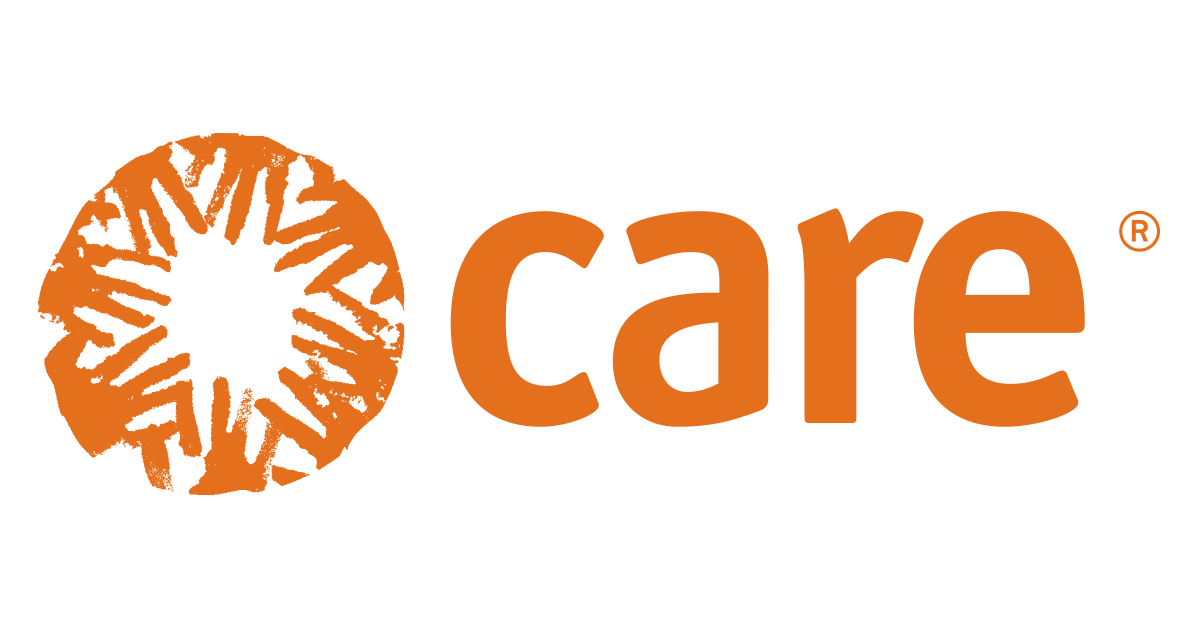
The Kati Collective’s work revolves around developing equity-focused strategies. Malaria No More came to them with the hypothesis that fighting malaria through a gendered lens could improve malaria eradication while also enhancing gender equity. Kati Collective set out to research and test this theory and the effects of malaria on women. Their research showed that women spent significant time caregiving for malaria cases, four times as much as men. Better yet, they found that malaria eradication is one of the most effective levers for reversing poverty for women. In Uganda, for example, the 3.3 million children under 5 treated for malaria annually creates an economic impact of $333 million for their families.

Cancer
For the Fred Hutch Cancer Institute, education and awareness are an important part of reducing disparities in cancer diagnosis and outcomes around the world. Their Breast Cancer Initiative aims to reduce disparities globally for 2.5 million women by 2025 through information and outreach. Similarly, they founded the Breast Health Global Initiative with Susan G. Komen, which is an alliance of health organizations, companies, and providers that develops affordable and culturally appropriate guidelines for breast health and treatment in low- and middle-income countries. In a partnership with the Uganda Cancer Institute, the UCI-Fred Hutch Cancer Centre in Kampala serves the larger region and sees 20,000 patients each year.

Last year, the Max Foundation launched the Max Access Solutions program to treat advanced breast cancer in nine Countries across Africa, Latin America, and South Asia with plans to expand this year. The organization’s mission is to accelerate health equity by delivering medication, technology, and services to cancer patients who are not otherwise able to get the care they need. Why breast cancer? It’s the leading cause of death for women globally as 80% of patients in developing countries are diagnosed at the metastatic stage and have poor access to treatment when they are finally diagnosed. Max is working with multiple partners to implement the program through its Humanitarian Partnership for Access to Critical Treatment (Humanitarian PACT) for Advanced Breast Cancer.

Community Health
Water and sanitation are also an issue that disproportionately affects women and girls, who typically bear the responsibility of fetching water. The Starbucks Foundation’s goal is to empower 1 million women and girls in coffee-, tea- and cocoa-growing communities by 2030 after they blew past their 2018 goal of 250,000 women in a little over half the time. Notably, their programs promote water, sanitation, and hygiene (WASH) as well as women’s leadership and economic development in 17 countries.

More than twenty years ago, Global Communities established an inpatient facility for women with high-risk pregnancies in Huehuetenango, Guatemala called Casa Materna (Mother’s House). In partnership with a local association of midwives and the Ministry of Health, the center trains community health workers to identify women with high-risk pregnancies and refer them to Casa Materna for care. The program has provided more than 100,000 indigenous Mayan women with culturally sensitive and high-quality reproductive health care and facilitated more than 13,000 safe deliveries.

Sukarya believes that society cannot progress without healthy women and children. Their Rural Community Health Action program tackles this issue from the lens of anemia and malnutrition in Haryana and Rajasthan, India. Covering 60 villages in the region, it focuses on strengthening detection, treatment, and prevention of anemia and malnutrition, as well as delivering immunizations and WASH components.
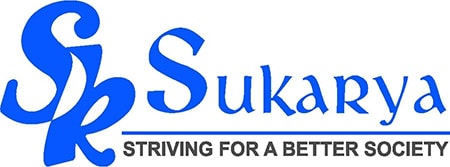
The Hunger Project looks at health from a holistic lens, through hunger, nutrition, water, and sanitation, and more. But the key to their approach is starting with women as they are typically the primary bearers of responsibility for the health and nutrition of a family, yet often lack the resources, knowledge, and freedom to fulfill this responsibility to the best of their abilities.

Emergency Situations
During an emergency like a natural disaster or war, breastfeeding might be the last thing on some people’s minds. But for World Vision, one of their primary focus areas is preventing malnutrition for infants, children, pregnant women, and breastfeeding mothers.
World Vision partners with ministries of health to establish safe spaces to breastfeed and find counseling, health and nutrition education, and breastfeeding support. Take Srijana who was seven-months pregnant when an earthquake hit Nepal in 2015, barely getting out of her house before it collapsed. World Vision not only helped her maintain her nutrition during pregnancy but gave her a space to safely breastfeed her “survivor” baby and develop the skills they needed to set themselves out on the right path.

Like World Vision, Americares also works to protect pregnant women in emergency situations. In Ukraine, they provide emergency obstetric kits for mothers forced to give birth outside of traditional health care settings. And in Colombia, thousands of expecting mothers have been traveling from the humanitarian crisis in Venezuela to seek basic health care at Americares clinics.
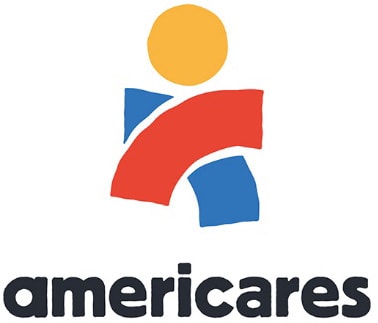
While these are just a selection of GlobalWA organizations at the forefront of the fight on women’s global health, they demonstrate the growing sea change in global health, shifting the focus to a world of health equity. Recognizing and addressing the unique health needs of women (who have a proclivity to depression and anxiety over men) is essential for achieving sustainable development goals and ensuring social and economic progress. Addressing women’s health issues can have a ripple effect, positively impacting future generations and creating healthier, more equitable societies where all individuals can thrive.
The following additional GlobalWA members are providing quality healthcare services and support through their programs in low- and middle-income countries where they work.
We envision a world where every person has access to quality health and education services, no matter where they live. We bring this to life by delivering leading programmes across Maternal, Newborn and Child Health, and Remote Community Development.
Kati Collective is a global consulting collaborative focused on understanding, analyzing, and advancing health and gender equity as an essential means of achieving global development goals. We believe in data-driven approaches and that many perspectives, both local and global, must come together for impactful and equitable systemic change.
Kati offers tailored approaches for strategy development, evaluation, process management, design, facilitation, management of communities of practice, and co-creation with local organizations.
Panorama Global is a platform for social change. We partner with changemakers to create an equitable and sustainable world where all people thrive. Our initiatives span global health equity, climate change and sexual and reproductive health and rights (SRHR), adolescent mental health, and gender equity, among others. Learn more about Panorama’s work.
The Type 1 Diabetes Community Fund aims to unlock resources for historically underfunded community-based organizations (CBOs) in low- and middle-income countries while uplifting their work and unveiling insights into the challenges of existing health systems and barriers faced by people living with type 1 diabetes. Learn more about our grantee partners.
Climate change is the greatest global health threat of the 21st century, with severe implications for women and girls’ sexual and reproductive health and rights (SRHR). Panorama is leading an initiative to bridge the gap in understanding the impacts of climate change on SRHR, an issue area frequently overlooked by researchers, policymakers, and funders. This work includes grantmaking to support community advocacy in the Global South, facilitating a funder Community of Practice, and building an evidence base in partnership with YLabs to advance climate-resilient women’s health and SRHR solutions.
Planned Parenthood Great Northwest, Hawai’i, Alaska, Indiana, Kentucky (PPGNHAIK)
PPGNHAIK draws upon its expertise as a leading provider of sexual and reproductive health services and comprehensive sexuality education to deliver capacity building support to partner organizations in low- and middle-income countries. Through these partnerships, PPGNHAIK’s Global Programs department supports efforts to improve sexual and reproductive health outcomes for young people.
Save the Children believes every child deserves a future. In the US and globally in more than 100 countries, the organization gives children a healthy start in life, the opportunity to learn, and protection from harm. Save the Children does whatever it takes for children, every day and in times of crisis, transforming their lives and the future we share.
SIGN Fracture Care supports surgeons in low- and middle-income countries (LMIC) by providing orthopaedic education opportunities and donating instruments and implants appropriate for use in austere settings that are designed and manufactured at our Richland, WA headquarters. This enables local surgeons to provide affordable and effective care for patients with long bone fractures.
The gold standard of long bone fracture care is to secure an intramedullary nail in the canal of the bone to stabilize the fracture. By making this treatment available in LMIC, SIGN Fracture Care enables people to quickly recover from fractures and return to health and full mobility. These patients avoid permanent disability and return to work, thus reducing the level of poverty in their community.
Thanks to support from our donors, we provide orthopaedic implants at no cost to hospitals or patients, which makes surgery to repair fractures accessible to impoverished patients. We partner with 431 hospitals in 57 countries and have helped more than 433,000 people recover from fractures over the past 25 years.
Spreeha empowers lives in Bangladesh through compassionate and sustainable solutions to its toughest challenges. At the forefront of this mission is SNEHO, meaning “affectionate” in English, Spreeha’s flagship health program. SNEHO seeks to bolster the nation’s health system by establishing a network of 100 community-led urgent health centers strategically positioned in underserved areas.
Each center, led by trained local health professionals like paramedics, nurses, or medical technologists, offers comprehensive services. These include doctor consultations, sample collection, pharmacies, first aid, and vaccination facilities. Additionally, the program extends its reach to home-bound patients through telemedicine and home visits. Ensuring affordability, services and products are provided at highly discounted rates, with patients receiving e-health records for informed decision-making.
Spreeha’s vision extends to achieving universal health coverage by leveraging technology-enabled hyper-local urgent health centers. By doing so, it aims to alleviate the strain on the overall health system while ensuring quality, accessibility, and affordability for all. Through SNEHO and similar initiatives, Spreeha is actively reshaping the healthcare landscape in Bangladesh for the better.
The Hunger Project facilitates individual and collective action to transform the systems of inequity that create hunger and cause it to persist. We work with rural communities in Africa, Latin America and South Asia, local governments and other health-focused civil society organizations to ensure access to healthcare services and education. In many of the countries where we work, the government is mandated to provide health services. In these cases, our teams work with communities to strengthen their health system through community-led advocacy and accountability. We create platforms for government health workers to leverage and expand their reach. Additionally, through our programs, we equip local volunteer leaders with information, training and materials to go out and educate their communities on key health topics, including nutrition, HIV/AIDS and malaria prevention and treatment, immunizations and maternal and childhood health. We believe that access to adequate healthcare is key to creating a world without hunger.
The most pressing global health challenge is the inequities in access to healthcare. Together, we can alleviate unnecessary suffering and premature death. We must be focused and committed to overcome barriers and ensure universal access for all. Healthcare should not be a privilege – it’s a fundamental human right.
At VillageReach, we are driven by a vision of a world where each person has the health care needed to thrive. We work with governments, the private sector, partners and communities to build responsive primary health care systems that deliver health products and services to the most under-reached.
Responsive systems ensure that health care services are available when and where they are needed, can adapt to changes in demand, and better absorb shocks and stresses, and routinely factor and respond to the needs and preferences of communities.
At VillageReach, we champion responsive primary health care (PHC) and focus our execution in those areas where our technical expertise is the strongest—supply chain innovations that get medicines, vaccines and equipment to people; tech-enabled primary health care that leverages solutions like telehealth that place health information in the palm of a hand; public and private sector engagement including supporting sustained financing of innovation; health information systems that illuminate who is and is not accessing PHC; and collaboration and support of health workers serving under-reached communities.
As a locally driven and globally connected organization working across Africa, VillageReach’s primary goal is to reduce inequities in access to quality primary health care for 350 million people by 2030.
Yemen Relief and Reconstruction Foundation
The Yemen Relief and Reconstruction Foundation (YRRF) plays a pivotal role in addressing the dire public health crisis in Yemen. Despite significant funding cuts and the complex political situation, YRRF remains dedicated to alleviating the suffering of Yemeni civilians. In 2023, YRRF implemented various humanitarian projects, including the distribution of food rations to 6,000 families during Ramadan, benefiting 34,000 individuals, and delivering meat to 6,000 families during Eid al-Adha.
Furthermore, YRRF’s efforts focused on supporting malnourished children. The foundation supported multiple malnutrition centers across Yemen, providing critical support to approximately 950 children monthly. YRRF offered immediate nutritional support and extended care for six months post-treatment to prevent relapse. Additionally, YRRF distributed hygienic materials and conducted workshops to educate families on proper feeding practices. YRRF also distributed 750 water filters, ensuring access to clean water.
YRRF also developed a culturally appropriate curriculum to train teachers and school counselors in identifying and addressing PTSD among middle and high school students. Moreover, YRRF launched a vaccination awareness campaign to combat the resurgence of preventable diseases like measles and polio., especially with the spread of dis- and misinformation about vaccines.
YRRF’s comprehensive approach to public health in Yemen demonstrates a steadfast commitment to improving the well-being of vulnerable populations amidst ongoing conflict and economic hardship.
Organization Profile
Providence Global Programs
By Joel Meyers, Director of Communications, GlobalWA
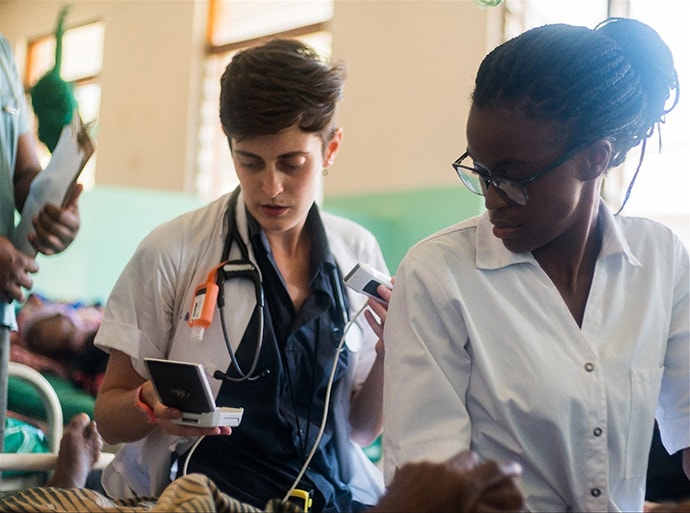
Providence doctor mentoring KUHeS medical student at Mangochi District Hospital. Photo courtesy of Kamuzu University of Health Sciences
You may know Providence as a US-based healthcare provider, especially if you live in the western half of the continent. In fact, they have 120,000 caregivers serving in 51 hospitals and over 1,000 clinics, senior services, supportive housing, and many other health and educational services.
Providence’s Global and Domestic Engagement department has supported healthcare practitioners around the globe since 2012 with training, mentoring, and infrastructure improvement initiatives through key partnerships.
These initiatives embody the Providence vision of “health for a better world” by responding to root causes of disparities and working through local partnerships to redress some of the health inequities created by colonization and systemic racism.
*****
I was first introduced to Providence Global Programs (the “Global” half of Global and Domestic Engagements) through Fast Pitch at our 2023 Goalmakers Conference. Fast Pitch is a segment of the conference where select members stand on stage in front of the conference audience and for two minutes introduce their organization – a fun event that showcases our members’ programs and broadens understanding. You can view a recording of Fast Pitch 2023 here (Providence Global Programs starts at 11:30).
Through Fast Pitch we learned Providence is making an impact through partnership in communities around the world and I wanted to know more and help share this wonderful program with our readers. I was able to connect with Carrie Schonwald, the Director of Providence Global Programs and through the interview we talked about the values that drive this program, the impact it is having, and the partnerships that have provided opportunities for Providence to live into its mission globally.
Guiding Principles
Providence Global Programs is both guided by and is a proud signatory of the Brocher Declaration, which states: “Rather than coming from a mindset of helping and giving, the Brocher Declaration shifts the paradigm of short-term experiences in global health to that of learning and sharing. Relationships between host countries and visitors should be mutually beneficial, with local voices and expertise of host country professionals driving the agenda for health care work.”
Carrie elaborated. She said, by signing and embracing the Declaration, “this was really to say, let’s say this loud and proud. We are about moving the needle on health equity, and equity means being community led. It means supporting the initiatives of a local partner and feeling honored by that and learning and being a learner in that rather than thinking that just because we’re American and we have money that we know more important things. There’s so very much that we don’t know.”
This approach builds bi-directional learning into all the engagements Global Programs supports. And because it’s built into the DNA of their programs, it more directly serves the local communities who have their own vision for their future.
Malawi – investing in a new generation of physicians through education and infrastructure
Since 2017, Providence Global Programs has worked in partnership with the Kamuzu University of Health Sciences (KUHeS) in Malawi and Family Medicine residency programs across the Providence footprint to facilitate bi-directional learning between Malawian and Providence Family Medicine residents. The primary goal of this bi-directional partnership is to increase the pipeline of high-quality primary care clinicians in Malawi, while providing critical training in resilience and compassionate care to US doctors.
This partnership supports the learning of Malawian trainees at both the medical school and post-graduate level, and strategically focuses on broad-spectrum family medicine, which is especially important, since there is such a low physician to patient ratio in lower resource environments. To note, there are currently fewer than 1000 doctors for over 20 million residents of Malawi.
Education
Providence funds a full-time position for a US family medicine doctor to serve as adjunct faculty for the Department of Family Medicine at KUHeS to serve the rural, 500 bed Mangochi District hospital, which is a Family Medicine training site for the department.
“The U.S. doctors are helping to manage,” Carrie explained, “the education of up to 200 clinician trainees per year in family medicine.”
She continues, “We fund US doctors to go there. The US residents go, and they support the learning and mentorship for Malawian family medicine learners. They’re not providing direct patient care. They’re not doing cowboy medicine. They are there as learners and teachers. They learn a tremendous amount from their Malawian colleagues about tropical medicine, about chronic disease management and more than anything about resiliency in a very low resource context.”
Providence also brings several Malawian family medicine medical residents, called registrars, to Seattle for six weeks every fall. These registrars do an observational clinical rotation with the Swedish First Hill Family Medicine Residency, take a University of Washington certificate program on global health leadership, and finally, present at an American Academy of Family Physicians annual conference.
Educational Infrastructure
During Covid, Providence provided five point-of-care ultrasound devices at their partner’s request and funded the training of trainers to utilize them. These devices are an incredible technological development serving across low-resource health systems. Practitioners can carry these handheld rechargeable devices and use them to diagnose a wide spectrum of medical ailments.
Providence also funded the construction of a skills simulation lab in 2021 that will provide simulation training opportunities to about 200 clinical learners a year.
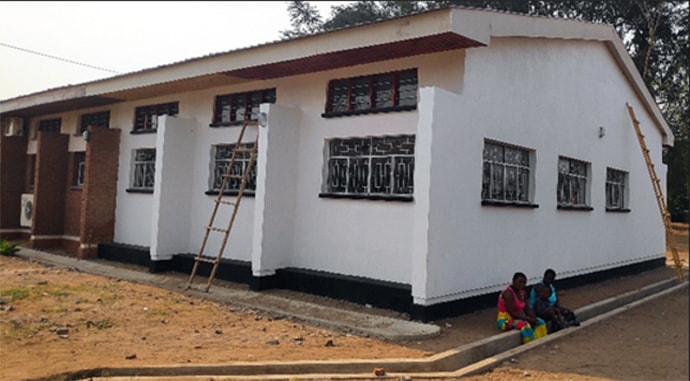
Medical skills simulation lab at Mangochi District Hospital. Photo courtesy of the Dept. of Family Medicine, Kamuzu University of Health Sciences
And, Carrie stated, one of the goals of the program has started being realized, of training practitioners “who would then become the future leaders of healthcare in Malawi. Since 2017 we’ve had 10 Malawian family medicine registrars who have come through our program here, and the dream was always that those trainees would then occupy positions of healthcare leadership in Malawi, and several of them already do so. Two of the doctors from our first cohort are now faculty at KUHeS.”
Facilities Infrastructure
Providence Global Programs also supported improvements in water, hygiene and sanitation (WASH) facilities at five different clinics throughout the Mangochi District Diocese. That critical work is led by Catholic Relief Services to implement the Vatican initiative on WASH through the Dicastery to Promote Integral Human Development.
“We have provided a pretty significant amount of funding to Catholic Relief Services over the last few years to improve water, health, and sanitation facilities at five different clinics across Mangochi district,” Carrie noted. “And that’s been an incredible opportunity to branch into a different aspect of global health and improve the healthcare system for the Mangochi population in a new way.”
Building capacity globally through digital mentorship with World Telehealth Initiative
Since 2021, Providence has partnered with World Telehealth Initiative to provide a pipeline of volunteer tele-mentors for clinicians around the world in lower resource settings. World Telehealth Initiative provides a way for global clinicians to connect digitally and build clinical knowledge capacity in settings where continuing medical education and specialist consultations are very limited. Telementoring and helping clinicians using a Teladoc device (a high-resolution live-stream technology) has been very rewarding for dozens of Providence volunteers, especially during Covid. The devices are so high resolution that it really allows mentors to feel like they are in the room where their global colleagues are.
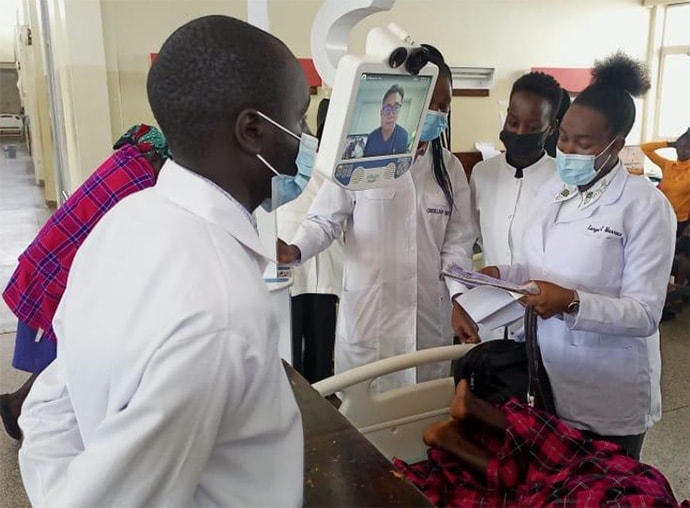
Providence doctor provides tele-consultation to providers in Longisa, Kenya. Photo courtesy of World Telehealth Initiative
Providence volunteers (Carrie informed me they volunteer a minimum of an hour per month) teach and mentor groups of clinicians at one of over twenty global locations where WTI partners. During these sessions, they arrive collaboratively at diagnoses and treatment plans, or “they may provide a specific lesson to a small group of clinicians or teach an entire class with dozens of clinicians. So, it’s very malleable and based on what the needs are at that moment for the local clinician(s) and what the skill set is of the volunteer clinician.”
Telementoring, Carrie explained, is an “incredible antidote to burnout that so many clinicians are experiencing.” And they can do it, literally, from their own living rooms.
WTI – Providence collaboration video.
Global Mentorship Initiative – telementoring non-clinicians
Also known as GMI and a GlobalWA member, Global Mentorship Initiative is another key partnership in Providence’s Global Programs portfolio.
GMI bridges the gap between graduation and first career jobs for underrepresented young professionals from diverse communities. GMI university partners nominate motivated, high potential, underrepresented students as they prepare to graduate and enter the workforce. They then match these students with mentors, in this case from Providence. The mentorship consists of 12 one-hour virtual sessions via videoconferencing and focuses on building confidence and developing soft skills transferable across any industry. Students and mentors set their own schedule. There is no obligation to maintain contact beyond the 12 weeks.
Carrie said that this partnership has been a wonderful way for their non-clinical employees, of which they have “tens and tens of thousands,” to be able to give back.
“It’s an incredibly fulfilling mentorship,” Carrie reflected, “and it’s been really great for us to be able to identify a non-clinical volunteer opportunity, because Covid very much changed the kind of opportunities we have for our employees to be able to volunteer globally. We have been so grateful to have both a clinical and a non-clinical way for our employees to serve communities around the world as this kind of service brings people closer to our mission and renews their sense of purpose in their own work.”
Health for a better world
Service and solidarity beyond borders are essential to Providence’s Mission as a not-for-profit Catholic health system. In its very DNA, the organization’s founding is a result of global outreach from the Sisters of Providence and the Sisters of St. Joseph of Orange who journeyed to the west from Montreal and France. The sisters continue to partner around the world and have always had a vision for Providence to continue partnering with communities beyond our borders.
All of these examples allow Providence to be a leader in creating “health for a better world”, whether it’s from people’s living rooms or boots on the ground.
In her closing remarks, Carrie shared that Providence Global Programs is also part of different global health coalitions both within and outside of Catholic healthcare which allows them to both learn and provide thought leadership, “What is our role in global health and how can we support critical work, or at least educate ourselves and others about that work. We’re always excited to learn about new ways that we can think about global health, and particularly to think about decolonizing and really being self-conscious about our role in global health, and not wanting to perpetuate racist systems or inequitable systems, but rather be a supporter of ongoing change in those systems. That is how we create ‘health for a better world’.”
Goalmaker
Behind the Numbers: Rachel Ndirangu’s Personal Journey to Close the Gender Health Gap
By Amber Cortes
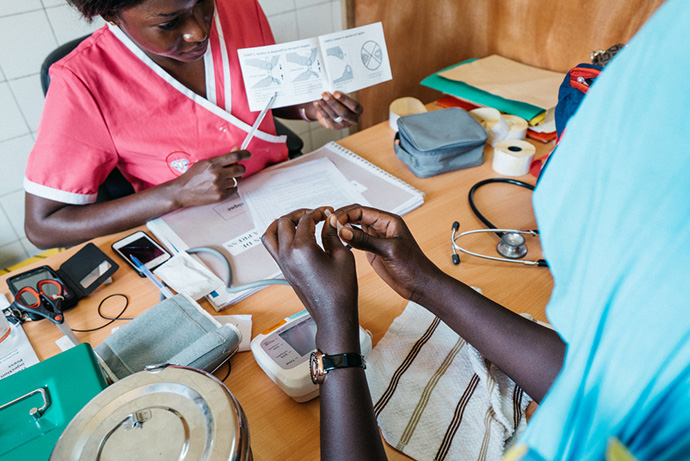
A health care worker explains to a patient how to self-inject Sayana Press, the DMPA-SC self-injectable contraceptive, at the Dominique Health Center in Pikine, Senegal. Photo: PATH/Gabe Bienczycki
Rachel Ndirangu knows her numbers.
“Nearly 300,000 women die annually from preventable causes related to pregnancy and childbirth, with 95% in LMICs,” says Rachel, the Africa Regional Director for Advocacy and Public Policy at PATH, an organization that works in countries around the world to advance health equity and close the gender health gap.
For Rachel, these aren’t just statistics—it’s personal.
Rachel was born in the Rift Valley, Kenya “in one of the very lush, green tea plantation areas” where she grew up in a family of four siblings.
At the age of three, she lost her biological mother to eclampsia, a hypertensive disorder of pregnancy that causes seizures, and one of the main direct causes of maternal deaths in Africa.
As Rachel got older, she became curious about the health inequities and health system challenges that contributed to her mother’s death, particularly in her region of Sub-Saharan Africa.
“It gave me a chance to start thinking critically about, you know, why did that happen? Would it have been prevented? And appreciating that it didn’t just happen to me, this happens to hundreds of families daily,” says Rachel.
“And I think this spurred in me the need to work in the global health space. And particularly advocating for equitable access to essential health services for women and girls.”
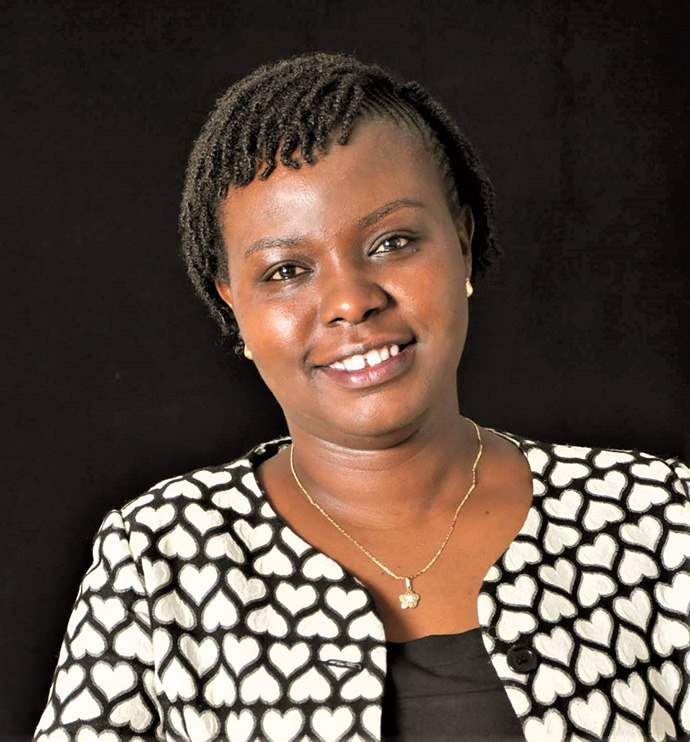
Rachel Ndirangu, Project Director, Advocacy and Public Policy at PATH
Now a mother of three, Rachel continues to grow her passion to close the health equity gap for women and girls, particularly in her region.
Her role at PATH involves identifying solutions to address policy and financing barriers and accelerate improvement in core primary health care outcomes especially related to Maternal Newborn and Child Health and advancing global health research and development.
Rachel focuses on advocacy and public policy work in Africa. It’s rewarding, she says, to collaborate with diverse partners including policymakers, global health partners, local advocates, and communities to bring health within reach of everyone.
But finding support from public officials and policy makers is not without its challenges.
“Policy influencing is not as easy as just presenting data, or making a human rights argument or an economic argument,” says Rachel.
“Advocacy must be directed to the hearts and minds of these decision makers in order to inspire action.”
For Rachel, this means building relationships through inclusive and continuous dialogue, which takes investments of time and financial resources. Rachel sees every collaboration as an opportunity to build trust, and empower constituents with a sense of ownership and political will.
Using this philosophy, in a long process of addressing policy barriers impacting access to newborn and child health services, Rachel and her team were able to engage policymakers in Kenya around the need to come up with the first ever unified policy for Maternal Newborn and Child Health. This was further reinforced by the adoption of a comprehensive Primary health Care policy framework and Primary Care Networks implementation guidelines that are strengthening the delivery of integrated person center services and products for women, children, and wider communities.
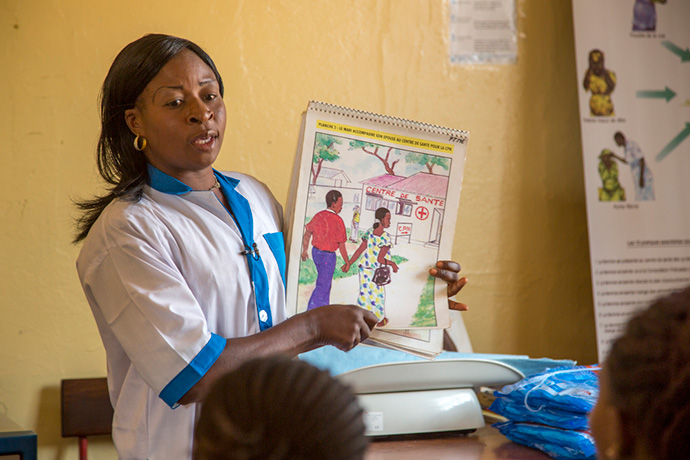
Melanie Impanga Kalenga, a “Mentor Mother,” delivers a health talk to mothers at Kenya General Reference Hospital in Lubumbashi. Mentor mothers are HIV+ women who have successfully given birth to an HIV-negative child and now mentor other HIV+ women who are pregnant. Photo: PATH/Georgina Goodwin
A key highlight of PATH’s policy advocacy in 2023 Uganda is the adoption of the country’s updated and responsive Reproductive, Maternal, Newborn, Child, Adolescent and Aging Health and Nutrition (RMNCAAH+N) strategic Plan, along with an Advocacy Toolkit to help strengthen accountability across all stakeholders. This policy document serves as an important tool for guiding prioritization, planning and resource mobilization for provision of essential health services and technologies as well as tracking of health outcomes for women, girls, and children in Uganda.
“So, it just shows the importance of having actions grounded in strong policies that then rally all actors towards a common action agenda,” says Rachel.
Rachel and her team in PATH have also played a critical role in helping countries understand, adopt, and ratify the African Medicines Agency (AMA) Treaty which aims to improve access to safe and effective medical products in Africa.
There is a need, Rachel says, to meet the challenges of building effective and efficient regulatory process for new products and pharmaceutical innovation that will increase equitable access to populations including women and girls.
According to Rachel, the health needs of women and girls, especially in low and middle-income countries (LMICs), are frequently overlooked, under-researched, and underfunded, leading to chronic underservice by health systems and limited access to comprehensive and affordable care. Regulatory inefficiencies further delay the introduction of essential health products, denying millions of women timely access to lifesaving technologies.
High-income countries dominate the health research and development (R&D) agenda, neglecting the unique needs of women in LMICs, resulting in inadequate products and services. This is exacerbated by insufficient inclusion of women in product design.
There’s also, Rachel says, a tendency to address women’s health in silos, such as a program that focuses exclusively on family planning while another focuses exclusively on HIV prevention for adolescent girls and young women, neglecting to address women’s health needs holistically.
Essential to meeting these challenges is PATH’s concept of self-care (hint: it’s not bath bombs).
“It’s really about enabling women’s access to interventions that place them at the center of their own health decisions,” says Rachel.
One example is the DMPA-SC injectable contraception, a an ‘all-in-one’ self-injectable contraceptive that protects against pregnancy for three months.
Such an intervention, Rachel says, has dual benefits, both to the individual by improving their health literacy, increasing their autonomy, and supporting them to participate directly in their health care, but also to the health system because it leads to more sustainable health systems by optimizing the time spent on patient interaction and reducing the burdens of health care providers.
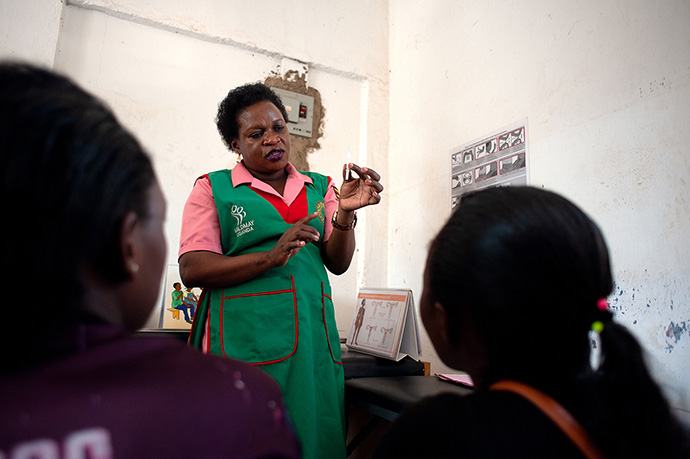
A health worker with Mildmay Uganda leads a family planning information session for clients, demonstrating the self-injectable contraceptive, subcutaneous DMPA (DMPA-SC). Photo: PATH/Will Boase
This kind of self-care, says Rachel, really has the transformative potential to preserve women’s autonomy, their choice, and even access.
“It’s broken some of the barriers related to, like, I need permission from my husband to go to hospital, or I need to have resources to be able to even just get money or transport to the hospital,” says Rachel.
“So, putting that choice and decision-making power in the hands of women has been quite impactful. In 2023 alone, nearly 1 million DMPA-SC self-injection visits took place across 59 countries that have approved it.”
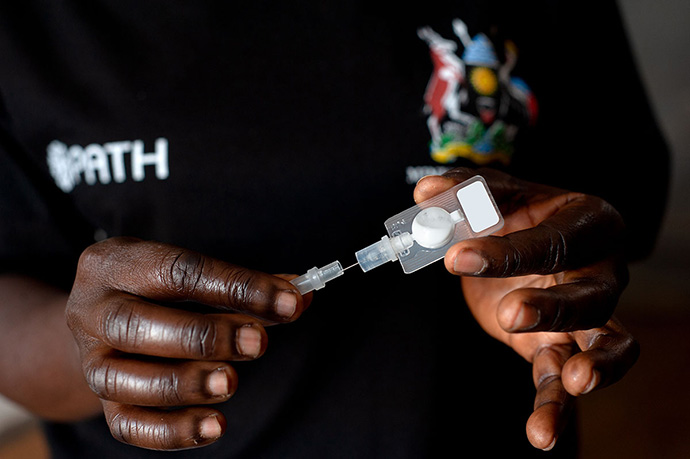
A community health worker in Uganda demonstrates the self-injectable contraception, subcutaneous DMPA (DMPA-SC). Photo: PATH/Will Boase
Another way to put the power of women’s health in their own hands is being sure women’s voices are included in the R&D process.
In 2023, with support from the Bill and Melinda Gates Foundation, an analysis was conducted by PATH on women’s inclusion in health R&D processes in Kenya and Nigeria, examining policies and assessing the implementation of laws promoting women’s health R&D.
Findings revealed a significant gap between policy and practice: only 25% of clinical trials in these countries exclusively addressed women’s health concerns. Cultural, social, and religious barriers contribute to limited participation in clinical trials and STEM education, resulting in products that inadequately address women’s needs.
The study suggested focusing on policy implementation, establishing funded programs for women’s healthcare careers, providing mentorship opportunities, and collaborating with women-led health advocacy organizations to advance inclusive R&D agendas for women.
Rachel says there’s only one way that global health organizations can focus on meeting the needs of women and girls.
“We need to harness the collective power of innovation, research, and advocacy to create a world where every woman and girl has access to the health care they deserve. But to do that, we need to put women at the center and always remember the investing in women’s health is investing in the global economy!”
Member Blogs
Kati Collective CSO Engagement is Key to Localization Efforts
Mercy Corps Building Hope: Stories of Resilience in the Venezuelan Migration Crisis
Spreeha Foundation Navigating Healthcare Maze: Spreeha’s Tech-driven Local Urgent Health Network
VillageReach Lights, Camera, Vaccinate! How Malawi Uses Drama to Boost Immunization Rates
Yemen Relief and Reconstruction Foundation (YRRF) Addressing Vaccine Dis- and Mis-information in Yemen
Global Communities Bridging Healthcare Gaps for Island Communities in Ghana
Welcome New Members
Please welcome our newest Global Washington members. Take a moment to familiarize yourself with their work and consider opportunities for support and collaboration!
Burn DesignLab
Burn Design Lab’s mission is to improve lives and protect the environment through the research, design, and development of outstanding cookstoves. Burndesignlab.org
Member Events
June 4
International Rescue Committee (IRC) Annual Fundraising Dinner
Career Center
Director of Strategic Partnerships Ashesi University Foundation
Development Assistant VillageReach
Executive Director A Child’s Notebook
Youth Summer Program Counselors FIUTS
Director of Public Sector Engagement The Max Foundation
Check out the GlobalWA Job Board for the latest openings. Back to Top